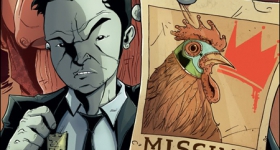THE MONSTER hiding under your bed is old news. There's something more nefarious and deadly lurking in your bedroom that you should be scared of: the electric fan. Getting goose bumps yet? I 'm guessing the answer is no-unless you're South Korean.
"I've never heard of this phenomenon before, and personally, I always slept with the fan on when I was younger," said Michelle Nguyen, a research associate at NERA Economic Consulting in San Francisco. "To me, it sounds similar to tales told by adults to younger children to discourage certain behaviors, like when my dad told me that sleeping with wet hair would result in headaches or that it was bad luck to directly hand someone a toothpick. What really amuses me about this superstition is that the end result is so extreme; what possible explanation could there be for this?"
Fan death is a widely shared belief in South Korea. Many South Koreans believe that sleeping with a fan running in an unventilated room will lead to death by suffocation, hypothermia or poisoning. Before you scoff at such a tall tale, it's important to take a look at how such a belief was able to take root and maintain its existence for decades, despite advances in science. According to a 2007 Reuters report, major Korean newspaper JoongAng Ilbo first reported on fan death in the early 1970s, a time when the growing nation was trying to manage higher energy prices. Some believe that the Korean government wanted to purposefully discourage citizens from running fans at night.
Upon a more careful inspection of what is regarded by physicians and scientists outside of Korea as an urban legend, we see a complicated passing down of an old wives' tale. The media, health professionals and scientists in Korea seem to be propagating this myth and distorting people's notions of what is fact and what is fiction. Up to this day, many news stations report on incidents of fan death, and even the Korea Consumer Protection Board, a South Korean government-funded agency, released a warning to consumers in 2006 after "analyzing injury data related to summer accidents collected for the past three years." One of the top five summer accidents was "asphyxiation from electric fans."
Sam Hong, the manager of Koreana Plaza in Rancho Cordova, CA, spoke about the electric fans that are sold each summer in his store: "We sell fans manufactured in Korea. They are equipped with timer settings to prevent fan death. I believe you can die if you sleep in an enclosed room, where none of the windows are open, with a fan running. When I was in Korea, I heard about these accidents a lot."
Some theories on how using an electric fan at night can cause death include the explanation that the fan sucks out all the oxygen inside the sealed room, leading to a vortex effect and suffocation; that the body's metabolism slows down at night, resulting in hypothermia; and that the fan uses up all the oxygen in the room, while creating toxic levels of carbon dioxide. According to experts, all three of these popular theories have no scientific basis.
"All urban legends work with 'not all too uncommon events,'" said Dr. Cliff Kim, an internal medicine physician of the Veterans Health Administration. "Leaving the fan on in the summer, dying in one's sleep-these are not uncommon occurrences, and it is very plausible that these two events can happen together."
He cites the black cat superstition as a perfect example: "We use simple association to say black cats cause bad luck. Then if two people say the same thing, it becomes proof. It is human nature to want to explain things, to match up a cause with an effect. This is how we buy stock, make investments and carry out other everyday decisions."
Kim says that when he was growing up, an upside-down spoon at the dinner table was a big no-no, an omen that all your good fortune will spill out. My own mom tells me about a superstition that involves seeing cracked teeth in your dream, and this being a sign that a friend or family member will pass away in the near future. But no one urban legend seems to have infiltrated a country quite like the fan death urban legend.
"I spoke to a Korean friend about fan death and she knew exactly what people were afraid of," said Liz Shen, a legal assistant for a law firm in Washington, DC. "She had heard the warnings from her parents when she was a child, and those fears are so deeply instilled in her that she still does not sleep with the fan on in her room. She said she doesn't believe it's real, but she still avoids using a fan."









Comments